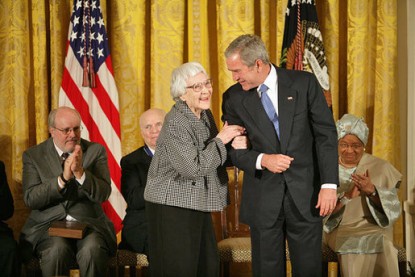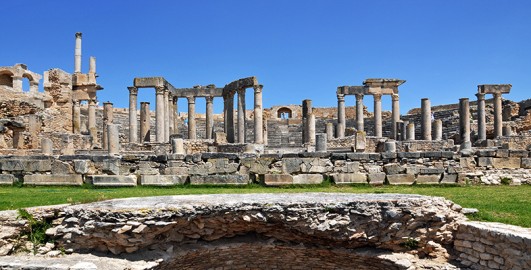 article icon
article icon
History & The Arts
Harper Lee's life was as surprising as any work of fiction
Harper Lee, who has died at the age of 89, had a life that was as curious as any plot from a novel. Writing in 2015, before the publication of Go Set A Watchman, Professor Richard Gray shared some of the story.
History & The Arts
Art and Visual Culture: Medieval to Modern
Have you ever wondered about the visual remains of past centuries that still survive in our cities and countryside today? Are you baffled by modern art? This collection provides you with insights into different aspects of art and visual culture between the Middle Ages and the present day. You will discover the wonders of medieval stained glass ...
 free course icon
level 2: intermediate icon
free course icon
level 2: intermediate icon
History & The Arts
History of reading tutorial 2: The reading and reception of literary texts – a case study of Robinson Crusoe
How have famous books been read and received by audiences in the past? This free course, History of reading tutorial 2: The reading and reception of literary texts a case study of Robinson Crusoe, is the second tutorial in a series designed to help users of the UK Reading Experience Database (UK RED) search, browse and use this resource, and ...
 article icon
article icon
Health, Sports & Psychology
Should we test drugs on pregnant women?
The idea might seem ridiculous. But as science writer Emily Anthes explains, there's a strong case for testing drugs on women who are pregnant.
 free course icon
level 3: advanced icon
free course icon
level 3: advanced icon
History & The Arts
Voice-leading analysis of music 3: the background
The music of Mozart has been used to examine the foreground and middleground of harmony in free courses AA314_1 and AA314_2. In this free course, Voice-leading analysis of music 3: the background, you will use Beethoven's Eighth Symphony to consider the largest-scale stage of voice-leading analysis.
 free course icon
level 3: advanced icon
free course icon
level 3: advanced icon
History & The Arts
Helen Langdon's ‘Caravaggio’
Accounts of Caravaggio's life are filled with suggestions of murder and intrigue. But does knowing more about this dark artist's experiences help us to interpret his art? Or does understanding his motivations cloud their true meaning? This free course, Helen Langdon's 'Caravaggio', explores the biographical monograph, one of the most common ...
 article icon
article icon
Science, Maths & Technology
Deplaning: Why is the 747 coming to the end of the runway?
For a long time, the 747 has dominated the skies. But Boeing is slowing production. How come?
 free course icon
level 3: advanced icon
free course icon
level 3: advanced icon
History & The Arts
Exploring a Romano-African city: Thugga
From Rome to Pompeii and Ephesus the excavation of Roman remains is well known, but what of Roman remains in Africa? This free course, Exploring a Romano-African city: Thugga, looks at the Roman city of Thugga and examines the influence that Roman architecture and art had on Africa and its people.
 free course icon
level 3: advanced icon
free course icon
level 3: advanced icon
History & The Arts
Voice-leading analysis of music 2: the middleground
This free course, Voice-leading analysis of music 2: the middleground, continues our examination of 'voice-leading' or 'Schenkerian' analysis, perhaps the most widely used and discussed method of analysing tonal music. In this course, this method is explained through the analysis of piano sonatas by Mozart. The course is the second in the AA314 ...
 free course icon
level 3: advanced icon
free course icon
level 3: advanced icon
History & The Arts
Voice-leading analysis of music 1: the foreground
This free course, Voice-leading analysis of music 1: the foreground, introduces 'voice-leading' or 'Schenkerian' analysis, perhaps the most widely used and discussed method of analysing tonal music. In this course, this method is explained through the analysis of piano sonatas by Mozart. The course is the first in the AA314 series of three ...
 activity icon
activity icon
Health, Sports & Psychology
Right to die: what about other circumstances?
Reasons for individuals chosing to end their life vary - is there one straightforward answer to the question 'do we have the right to die?' or is it more complicated than that?
 activity icon
activity icon
Health, Sports & Psychology
What are the rules around assisted suicide?
What are the legalities of assisted suicide, is it accessible for all and should it be?